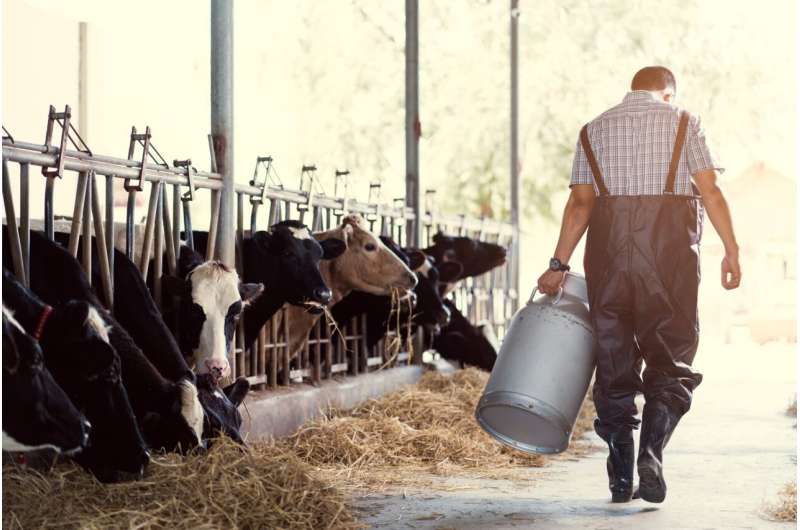This article has been reviewed according to Science X's editorial process and policies. Editors have highlighted the following attributes while ensuring the content's credibility:
fact-checked
reputable news agency
proofread
CDC reports third dairy worker infected with bird flu, risk to public remains low

Amid an ongoing outbreak of bird flu in dairy cows, there's been a third case of H5N1 avian flu confirmed in a dairy worker, U.S. health officials reported Thursday.
The previous two human cases—the first in Texas, the second in Michigan, where this latest case also occurred—involved only a brief discomfort of the eyes, linked to conjunctivitis ("pink eye").
However, this third case is the first to present with more typical respiratory symptoms, the U.S. Centers for Disease Control and Prevention noted in a health update.
"The patient reported upper respiratory tract symptoms including cough without fever, and eye discomfort with watery discharge," the agency said. "The patient was given antiviral treatment with oseltamivir, is isolating at home and their symptoms are resolving."
H5N1 has so far not become easily passed between people, and because all three U.S. workers became infected after prolonged contact with dairy cows, the CDC said the case is "another instance of probable cow-to-person spread."
"Given the extent of the spread of this virus in dairy cows, additional human cases in people with higher risk exposures would not be surprising," the agency added.
The CDC is monitoring influenza activity closely in states affected by the H5N1 outbreak and said there's been "no sign of unusual influenza activity in people, including no increase in emergency room visits for influenza and no increase in laboratory detection of human influenza cases."
So, "the risk to members of the general public who do not have exposure to infected animals remains low," the agency stressed.
Besides treating and isolating the infected worker, the CDC said that "household contacts of the patient have not developed symptoms, are being monitored for illness and have been offered oseltamivir."
"No other workers at the same farm have reported symptoms, and all staff are being monitored," the agency added. "There is no indication of person-to-person spread of A[H5N1] viruses at this time."
The CDC believes the identification of this latest human case of H5N1 means systems put in place are working.
"The identification of an additional case of H5 is not surprising and shows the importance of a proactive public health response," the agency said.
Infectious disease experts worldwide have been alarmed, however, that an influenza strain previously isolated to birds has now made its way into mammals such as seals, dolphins, cows and—as reported earlier this week—alpacas.
The concern is that a mutation might arise which renders H5N1 easily transmittable among members of another mammalian species—people.
Right now, the danger seems to be limited to people who have prolonged contact with animals infected with the virus, such as dairy workers.
For these individuals, the CDC recommends they "wear recommended personal protective equipment when interacting with infected or potentially infected animals and monitor their health for 10 days after their most recent exposure."
"People should also avoid unprotected exposures to animal poop, bedding [litter], unpasteurized ["raw"] milk or materials that have been touched by, or close to, birds or other animals with suspected or confirmed A[H5N1] virus," the agency added.
Raw milk is a special concern, because pasteurization kills off the H5N1 virus. One study released last week found high levels of avian flu virus in raw milk, even after refrigeration.
More information: To find out more about H5N1 avian flu, head to the World Health Organization.
2024 HealthDay. All rights reserved.



















